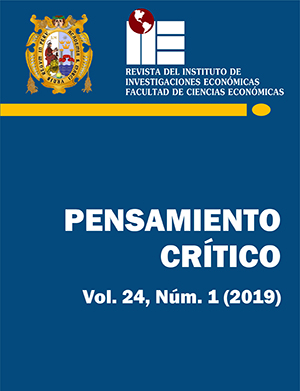Fiscal Policy segregation in the inflation targeting scheme
DOI:
https://doi.org/10.15381/pc.v24i1.16563Keywords:
Monetary politics; policy coordination; fiscal policy; debtAbstract
Fiscal policy enjoyed great popularity during the post-war period as the main tool of macroeconomic stability. With the passage of time it began to lose relevance, being relegated only to stabilize the cycles. The objective of this paper is to review why fiscal policy has been relegated to a second place within theoretical analyses and to analyze its “implicit” role in the New Macroeconomic Consensus. While it is true that monetary policy has been responsible for creating the necessary conditions to generate stability, fiscal policy is crucial to reach the objective on the inflation rate.
Downloads
Published
Issue
Section
License
Copyright (c) 2019 Josefina León León, Juan Carlos Hurtado Ramos, César D. Alvarado Gutiérrez

This work is licensed under a Creative Commons Attribution-NonCommercial-ShareAlike 4.0 International License.
THE AUTHORS RETAIN THEIR RIGHTS:
a. The authors retain their trademark and patent rights, and also on any process or procedure described in the article.
b. The authors retain the right to share, copy, distribute, execute and publicly communicate the article published in Pensamiento Crítico (for example, place it in an institutional repository or publish it in a book), with recognition of its initial publication in Pensamiento Crítico.
c. The authors retain the right to make a subsequent publication of their work, to use the article or any part of it (for example: a compilation of their works, notes for conferences, thesis, or for a book), provided they indicate the source of publication (authors of the work, journal, volume, number and date).






